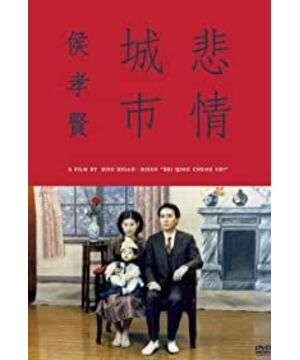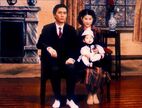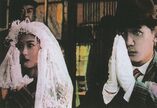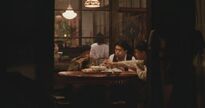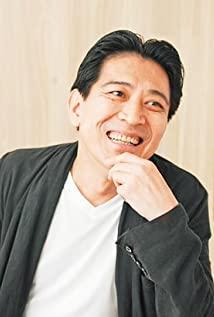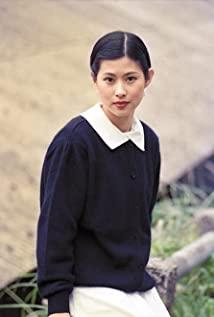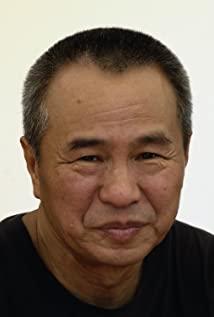The second review of "City of Sadness", although the film is two and a half hours long, the plot is contrary to Hou Hsiao-hsien's slow rhythm, and the rhythm is very tight, and such a complex plot can be presented in two and a half hours. It is not easy. . When you watch it for the first time, combined with the plot introduction, you can basically sort out the plot clearly, and you can also experience the grand background and sadness of the whole movie; but when you watch it the second time, you devote yourself to every scene, every dialogue, and every scene. Only by going into one detail, can we truly understand the greatness of this film and the lofty heights of director Hou Hsiao-hsien. Director Hou's films are always worth watching again and again, savouring them carefully, and pondering frame by frame. It is best to use a small book to record your feelings while watching, because Director Hou's films are always rich in information connotation and delicate in lens language. It makes people afraid to miss the details of a certain place and forget the experience of a certain moment. Although my favorite director Hou's film is still "The Wind and Dust", I have to say that "City of Sadness" is indeed the peak work of director Hou Hsiao-hsien.
The history of Taiwan from 1945 to 1949 is often overlooked, and it is almost never mentioned in the mainland. From the Treaty of Shimonoseki, when the Qing government separated Taiwan from Japan, and 1945, it took 50 years. The characters in the film grew up in this historical background. As mentioned in the film, they were "born away from the motherland", This generation is destined to be broken. The Lin family has four sons, the second is missing Nanyang, the third is crazy, the fourth is deaf, the big family is carried by the elder brother alone, and the scarred but still tough family is the epitome of Taiwanese society at that time. . That generation was destined to have an identity barrier, and their hearts were full of complex emotions. On the one hand, they hated Japanese rule and longed to return. On the other hand, they accepted the colonization of Japanese culture. They spoke fluent Japanese and even said The local dialects are mixed with Japanese vocabulary, and they also interact with Japanese people. From 1945 to 1949, Taiwan, who returned to the motherland for the first time, had various discomforts, political turmoil, social conflicts, and soaring prices. The film depicts the tragic life of ordinary people in Taiwan under such a historical background.
In 1945, when Taiwan returned to the motherland, the film started with the birth of the son of the elder brother Lin Wenxiong, implying the arrival of a new life. Tony Leung played the fourth sons Lin Wenqing and Kuan Rong, the Kuan Mei brothers and sisters, and a group of young people who were drinking happily, opened the window, and sang their expectations for the future to the vast world outside. However, expectations always stay at the beginning, and soon after various problems emerge, the competition of various gangs, government corruption, and soaring prices. In such a social environment, Kuan Rong and other aspiring young people devote themselves to the revolutionary cause; the third Lin family colluded with the Shanghai Gang but was framed and mentally deranged again; the eldest brother Lin family was under pressure from various aspects and struggled to maintain the prosperity of the family.
In 1948, social conflicts became more and more intensified, and the February 28 Incident broke out. Wen Qing accompanied Kuan Rong to Taipei to support the movement. Later, Wenqing and his friends were imprisoned, and Wenqing was released under the supervision of his family, but more patriots died in prison. Kuan Rong was injured and fled to the mountains for refuge. At the same time, he carried out underground work. Wen Qing secretly went to visit Kuan Rong. He also brought his last words to the father of his friend who died in prison. . This kind of mind and emotion is difficult for us when we grew up in a peaceful era. I usually don’t like the rhetoric of heroes from all walks of life, but when I saw this poem, I was moved and pressed tentatively, silently in my heart. Remember, life and death are bound together, "no thoughts, no thoughts" and no me.
Then, the eldest brother was killed in the gang conflict, and the mainstay of the family fell, but life had to go on. Wen Qing and Kuan Mei got married, and soon gave birth to Ah Qian. At the same time, they have been secretly supporting Kuan Rong and others financially. cause. The young couple, who seemed to be peaceful and independent, could not escape the great waves of the times in the end. Soon, the news of Kuan Rong's death came, Kuan Mei read the letter and fed Ah Qian, who was babbling, on the left was the bad news of her brother, and on the right was a child who was ignorant of the world. Death and new life, grief and hope, were intertwined at the same time. It only makes people sigh the fragility and impermanence of life. In the tragic era, the paradise could not be tolerated. Wen Qing and Kuan Mei did not escape. They took a group photo of a family of three. Three days later, Wen Qing was arrested.
The camera returns to the old house of the Lin family, and the whole family gathers around to continue playing cards and eating, and the life of ordinary people must continue. At the dinner table, people come and go, like a flowing water table, and it is very lively. In the end, it was Hou Hsiao-hsien’s habitual empty shot. The scene was over, and the round table was left empty. A light was flashing on the back. In 1949, the previous era came to an end, and another era began. The hardships continue.
Few of Hou Hsiao-hsien’s films have so many characters. It is these various forms of living beings that reflect the state of different groups of people in the society at that time, from the local Taiwanese families with strong rural atmosphere, to the foreign speculative Shanghai gangsters, and the idealistic young people. , The plot is like a big net, weaving all kinds of characters, and interpreting their tragic lives in the same era background.
Among them, I think the most successful one is Lin Wenxiong, the eldest brother of the Lin family. Lin Wenxiong, like his father, played the role of the rogue boss in the village, but he didn't do things like stealing chickens and dogs and hurting the world. He was a rogue to protect the villagers and fight against the Japanese. They are not heroes either. They are rude people who swear, eat, drink and gamble, but they are chivalrous and courageous, and they are well-deserved "big brothers". Lin Wenxiong is the mainstay of the family. He runs the shops in the family alone. The whole family depends on him to support more than a dozen people. He has to manage the relationship between the gangs outside. Like the lights of this family, it brings simple warmth and light to the family. Lin Wenxiong, who has a rough appearance, also has a tender side. When his wife gave birth, he prayed to the gods; when the baby was awakened from sleep, he gently patted his son; when he was thirsty, he directly poured the kettle into his mouth, The woman on the side scolded him not to teach bad children, and Lin Wenxiong was complaining about the woman's long-winded words a second ago, and immediately put down the kettle and replaced it with a teacup to drink water. An indomitable man must be able to afford it on the outside and put it down on the inside. And Lin Wenxiong's death is even more embarrassing. In order to avenge his brother who followed him, he fought alone with others. He was holding a short knife and fighting close to him. Bullets kill, but the ending is neat but unexpected. After all, Lin Wenxiong belonged to the old era, and his era was destined to be replaced by new forces.
Followed by the fourth son Lin Wenqing. Wen Qing has been deaf since childhood and may not be able to hear the disturbances of the outside world, so his heart can be so pure and peaceful. Wen Qing and Kuan Mei are different from the others in the film. They are like bystanders in this era, quietly witnessing everything. While friends were talking about current affairs and politics, Wen Qing and Kuan Mei exchanged music and childhood memories with pen and paper. At the same time, they are also the recorders of the times. Wen Qing uses a camera and Kuan Mei uses a diary. I think Lin Wenqing's deafness represents a characteristic of Taiwanese in that era, estrangement. Because Lin Wenqing couldn't hear or speak, there was a estrangement with the outside world, and Taiwanese were also full of estrangement because they were separated and colonized. Although the film is mainly based on Hokkien, it is mixed with Shanghai dialect, Cantonese, Mandarin and Japanese. The language first creates a communication barrier between people. In addition, the conflicts of interests and different behaviors of different people have caused the local Taiwanese. The gap between people and foreigners. The biggest estrangement is the Taiwanese’s self-identity. At first, they thought that they would get their identity when they returned to the motherland, but in fact, the government is not so tolerant and loving towards Taiwanese. There are also various terrorist policies, which make people's livelihood difficult. On the train to Taipei, Wenqing was questioned by the people who came to search for his origin, and issued the indecipherable three words "Taiwanese". This is the only time Wenqing speaks in the film. The phrase "Taiwanese" is just as difficult and lame. Wen Qing and Kuan Mei have always been the only ones in the film who have had a good time. They are pure and beautiful, and their family and friends are trying their best to protect them and prevent them from facing the bloody storm, but who can escape the giant hand of the times? Wen Qing finally Choosing to face it bravely, he inherited the fearlessness of his friends and the responsibility of his elder brother.
As mentioned earlier, the fourth son of the Lin family is the epitome of Taiwanese society at that time. If the eldest son represents grassroots, hard work and responsibility; the fourth son is incomplete and estranged; The third child, who returned to his family but went mad, represents Taiwan after returning to the motherland. After experiencing the ups and downs of wandering, he was still oppressed by the insiders, and his heart suffered great harm and distortion. Each character has its connotation and symbolic meaning behind it. Only by experiencing the living situation and psychological state of each character can we deeply understand the external appearance and internal scars of Taiwanese society at that time.
In addition, in a film about Taiwanese, Hou Hsiao-hsien did not forget to give delicate care to the Japanese living in Taiwan. Hou Hsiao-hsien did not blindly criticize the evil deeds of Japanese colonization, but told the history objectively while showing you the gentle side of ordinary people. In the film, the brothers and sisters Kuanrong and Kuanmei and the Shizuko brothers and sisters from Japan forged a deep friendship. They sang, arranged flowers and wrote poems together. When the Shizuko brothers and sisters had to go back to Japan, they gave Kuanrong and Kuanmei precious close-ups. things, as if a confidant in life is enough. The state of Shizuko's father before his departure reflects the confusion and helplessness of ordinary Japanese people as colonists. Under the overlapping of regimes, there is not only a sense of the vicissitudes of the Taiwanese, but also the loss of the Japanese. Everyone is insignificant in the context of the times, and the emotions of ordinary people are infinite for individuals. Jiang Xun said when speaking of "A Dream of Red Mansions" that a truly great artist will give equal care and sympathy to all groups in society. This is the greatest kindness. Cao Xueqin has it, and Hou Hsiao-hsien has it too. In this regard, I think these two artists from different eras have something in common.
The whole film gave me a lot of thinking, especially about Taiwanese society. The estrangement, self-cognition, and social contradictions mentioned above have all caused the complicated and embarrassing situation and state of Taiwanese. If you can have a deeper understanding of Taiwan's history and study Taiwan's society, you will be able to better understand the psychology of Taiwanese. Leaving aside the factors of political stance, I think there is a lack of mutual understanding and tolerance among modern people, or social groups, or even ethnic regions, and the world is full of prejudice and anger. Understanding is based on in-depth understanding. Only after understanding and understanding can we be tolerant, and only with a tolerant and open attitude can we achieve equal and positive communication without barriers.
"Sorrowful City" is an elegy of the times, just like the sad tunes performed by the Lahu and the singers who were angrily reprimanded by Lin Wenxiong in the film, it sang the joys and sorrows of that era. The whole film not only has an epic pattern and narrative, but also depicts the real life of ordinary people in Hou's film language.
The pace of the times and ordinary life continue...
View more about A City of Sadness reviews


